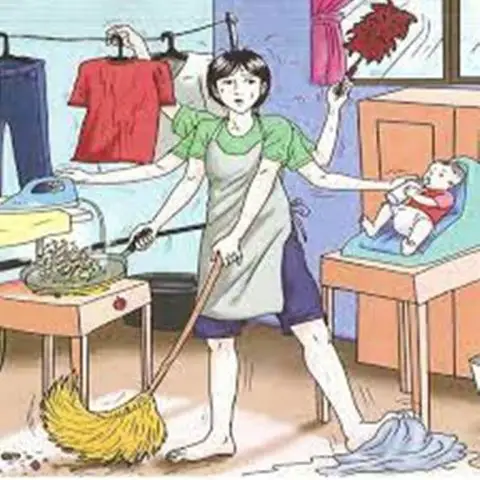In 1983, during the Second Latin American and Caribbean Feminist Encounter, July 22nd was established as the “International Day of Domestic Work”, in order to reveal two sides of the same coin. On the one hand, put in value the reproductive work (domestic and care tasks) carried out, in most cases, by women in their homes.

And on the other hand, make visible the degree of informality and precariousness that occurs when these tasks (be it caring, cleaning, cooking, washing, etc.) are outsourced. As shown by ILO data (2016), only in Latin America, 1 in 7 employed women works in this sector, where informality rates are around 80%, with very low wages, long hours and no access to social security.
Thus, from one side of the coin, the commemoration of the date seeks to highlight the essential nature of reproductive work for the survival of the human race. However, it also tries to problematize the “feminization” of it, which historically was imposed on women in a compulsory and free way. Already in the 1970s, the philosopher and Marxist-feminist activist Silvia Federici, warned: “what they call love, is non-paid work.”
Despite the changes produced in the family structure and dynamics since the mid-20th century, as a result of the incorporation of a significant number of women into the labor market, they continue to dedicate between 1 and 3 hours a day more than men to domestic work and between 2 and 10 more time daily to provide care for children, the elderly and / or the sick (UN Women, 2015). This difference grows when these tasks are carried out by women with disabilities, since they involve a greater amount of time and physical exhaustion than the average, although they are not usually considered in official statistics.
Of little recognition
Although reproductive tasks involve knowledge, resources and time – in addition to an important physical and mental involvement – they are not considered work per se, therefore, they receive little or no value, both economically and socially. This situation even shapes the subjectivities of some women, which is reflected in phrases such as: “I don’t work, I’m a housewife”, or in books titled, for example: “What mothers do, especially when it seems that they don’t do anything”(which although it seems out of time, was published at the beginning of this century).

The other side of the coin, for its part, tells us that the situation of sexualization and undervaluation is reproduced when domestic and care tasks are outsourced. And here lie several problems. Many women who enter the labor market delegate household and care tasks, again to women! Be these grandmothers, aunts, sisters, friends, etc. However, when this network does not exist or is not available, and there is no official care services and / or medical coverage that the dependent-caregiver may have, some women must resign from their jobs or settle for half-days poorly paid or precarious jobs.
Others, with greater purchasing power, go to the provision of domestic and / or care services, provided, in most cases, by women in socioeconomic vulnerability conditions (many of them, migrants). In this sense, unequal and exploitative relationships are reproduced among the same women, where white women from urban centers end up having better opportunities and jobs than poor, peasant, indigenous, migrant or black women. Thus, it ends up generating a stratification of domestic and care work that does nothing more than limit the labor insertion of women and promote the widening of the gender gap.
The capitalist and patriarchal system
In general terms, the two aspects developed up to now find their foundation in the capitalist and patriarchal system itself, which has historically naturalized and sexualized tasks, and has hidden them as a factor of social wealth, socially installing a binary logic of job classification, which assigns greater value to productive tasks to the detriment of reproductive ones.
Social activists on the one hand, encourage to problematize that logic of the productive and the reproductive; and from this, politicize the tasks of support, care, mothering. Locate them in a place of dispute, with potential rebellion; and not assume them as mere cogs of the patriarchal order.
And, on the other hand, to demand that the State establish public policies that promote and contribute to gender equality, understanding that reproductive tasks are not necessarily in the private sphere, but also in the public sphere. Therefore, when they are outsourced, they cannot depend on the economic condition of the people or be at the mercy of the market.

